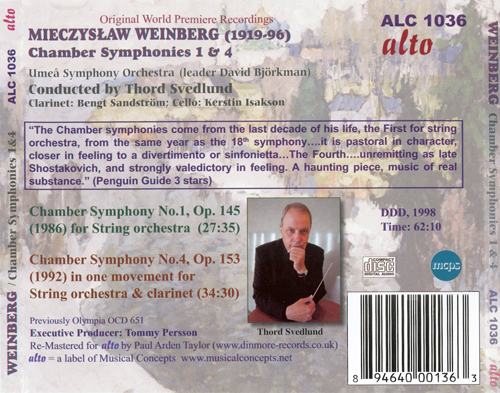
Cello – Claes Gunnarsson
Concerto No.2 For Flute And Orchestra, Op.148 (19:31)
Flute – Anders Jonhäll
Concerto No.1 For Flute And Orchestra, Op.75 (14:43)
Flute – Anders Jonhäll
Concerto For Clarinet And String Orchestra, Op.104 (25:49)
Clarinet – Urban Claesson
Concertmaster – Christer Thorvaldsson
Conductor – Thord Svedlund
Orchestra – Gothenburg Symphony Orchestra
17.3.22
WEINBERG : Соncertos (Thord Svedlund) (2008) SACD / FLAC (tracks), lossless
16.3.22
WEINBERG : Symphony No. 2 • Chamber Symphony No. 2 (Thord Svedlund) (1998) FLAC (image+.cue), lossless
WEINBERG : Cello Concerto • Symphony No. 20 (Thord Svedlund) (2012) SACD / FLAC (image+.cue), lossless
With the general increase in the popularity of Dmitry Shostakovich's music, that of his protégé Mieczyslaw Weinberg has also been gaining a hearing outside the former East Bloc. A Polish-born Jew, Weinberg survived two waves of Nazi invasion only to find himself buffeted by the same political forces as Shostakovich, by then his mentor, in the postwar Soviet Union. The Cello Concerto in C minor, Op. 43, dating from 1948, is parallel to Shostakovich's works of enforced conservatism from that period, but is somehow more joyful and genuinely melodic. More interesting is the Symphony No. 20, Op. 150, written in 1988 and here receiving its premiere recording. It's a roughly symmetrical five-movement work, on a large orchestral canvas, with slow movements with continuous melody on the outside, scherzo-like pieces of contrasting character second and fourth, and an extremely unusual centerpiece that seems to lose its integrity as it goes along. Weinberg in his later years seems to have tried to pursue avenues suggested by Shostakovich's very personal late works, and this piece, down to the Mahlerian feel, is in that vein. It's not Shostakovich, but it's quite absorbing, and the performances by Sweden's Gothenburg Symphony Orchestra are clean and on top of Weinberg's long lines in the outer movements of the symphony. A strong entry in the catalog of a composer on the rise. by James Manheim
Symphony No. 20 Op. 150 (1988) (39:37)
Concerto, Op. 43 (1948) (31:04)*
Cello – Claes Gunnarson *
Conductor – Thord Svedlund
Leader – Per Enoksson
Orchestra – Gothenburg Symphony Orchestra
WEINBERG : Chamber Symphonies Nos. 1 & 4 (Thord Svedlund) (1998) FLAC (tracks+.cue), lossless

Chamber Symphony No. 1, Op. 145 For String Orchestra (1986) (27:35)
Chamber Symphony No. 4, Op. 153 In One Movement, For String Orchestra And Clarinet (1992) (34:20)
Cello – Kerstin Isaksson
Clarinet – Bengt Sandström
Conductor – Thord Svedlund
Leader – David Björkman
Orchestra – Umeå Symphony Orchestra
WEINBERG : Symphony No. 3 • Suite No. 4 From 'The Golden Key' (Thord Svedlund) (2011) FLAC (tracks+.cue), lossless

Symphony No. 3, Op. 45 In B Minor (1949-50, Revised 1959) (32:40)*
Suite No. 4 From 'The Golden Key' For Large Orchestra, Op. 55d (1954-64) (17:01)**
Conductor – Thord Svedlund
Leader – Per Enoksson *, Sara Trobäck **
Orchestra – Gothenburg Symphony Orchestra
+ last month
MARTHA COPELAND — Complete Recorded Works In Chronological Order Volume 2 · 1927-1928 + IRENE SCRUGGS — The Remaining Titles 1926-1930 | DOCD-5373 (1995) FLAC (tracks+.cue), lossless
One of many early blues and jazz women who were overshadowed and ultimately eclipsed by Ma Rainey, Ethel Waters, and Bessie Smith, Martha Co...












.jpg)
.jpg)



